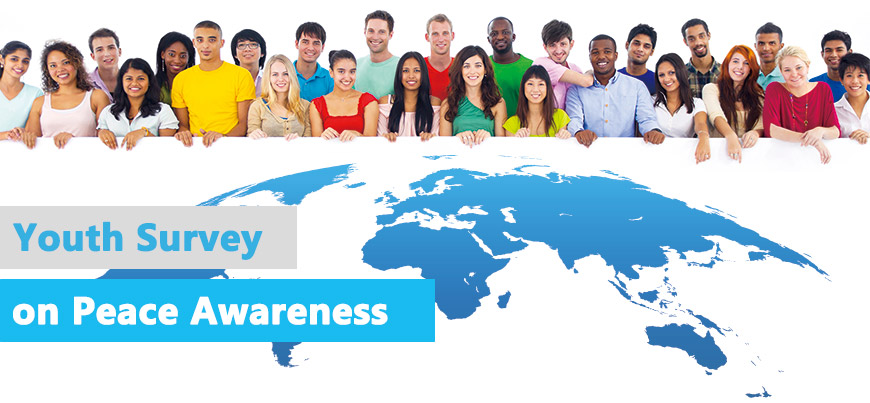
Introduction
As part of our efforts towards “Creating Peace,” the Goi Peace Foundation has developed various educational programs for young people.
Focusing on the diversity of participants in the International Essay Contest for Young People, which has been held annually for more than 20 years, we conducted a questionnaire-style survey of young people around the world, asking them about their perceptions of the current state of peace, their awareness of issues related to peace, what they would like to do to contribute to peace, and more.
The results of this survey will be used as a reference for the Foundation’s future educational programs, and will also be a useful resource for policy makers, educators, youth-supporting organizations and others around the world.
How we conducted the survey
Following a pilot survey in 2020, the Goi Peace Foundation invited all participants in the 2021 International Essay Contest for Young People to take the Youth Survey on Peace Awareness during the period from April to August, 2021. We received responses from 6,538 participants in 149 countries (including 239 from Japan), or 23.1% of the total 28,217 participants in 161 countries.
Survey respondents
The breakdown of respondents by region was as follows: 3,475 (53.2%) from 26 countries in Asia/Pacific; 173 (2.6%) from 16 countries in North America/Western Europe; 1,193 (18.2%) from 25 countries in Latin America; 542 (8.3%) from 28 countries in Eastern Europe/Central Asia; 224 (3.5%) from 13 countries in the Middle East; 905 (13.8%) from 41 countries in Africa; and 21 (0.3%) from other regions. (See list of countries by region in Table 0-1)
As shown in Figure 0-1, the gender breakdown of the respondents was 24.9% male, 74.3% female, and 0.8% others. Figure 0-2 shows the age distribution of the respondents, with 16-20 year olds accounting for 52.3% of all respondents.
| Region | Countries |
|---|---|
| Asia/Pacific | Australia, Bangladesh, Bhutan, Cambodia, China, Fiji, India, Indonesia, Japan, Laos, Malaysia, Maldives, Mongolia, Myanmar, Nepal, New Zealand, Pakistan, Papua New Guinea, Philippines, Singapore, Solomon Islands, South Korea, Sri Lanka, Thailand, Timor-Leste, Viet Nam |
| North America/ Western Europe |
Austria, Belgium, Canada, Denmark, France, Germany, Ireland, Italy, Luxembourg, Malta, Netherlands, Portugal, Spain, Sweden, United Kingdom, United States of America |
| Latin America | Argentine, Barbados, Belize, Bolivia, Brazil, Chile, Colombia, Costa Rica, Dominican Republic, Ecuador, El Salvador, Guatemala, Guyana, Haiti, Honduras, Jamaica, Mexico, Nicaragua, Panama, Paraguay, Peru, Saint Vincent and the Grenadines, Trinidad and Tobago, Uruguay, Venezuela |
| Eastern Europe/ Central Asia |
Albania, Armenia, Azerbaijan, Belarus, Bosnia and Herzegovina, Bulgaria, Croatia, Czechia, Georgia, Greece, Hungary, Kazakhstan, Kyrgyzstan, Latvia, Lithuania, Moldova, Montenegro, North Macedonia, Poland, Romania, Russia, Serbia, Slovakia, Slovenia, Tajikistan, Turkmenistan, Ukraine, Uzbekistan |
| The Middle East | Afghanistan, Bahrain, Iran, Iraq, Jordan, Lebanon, Oman, Palestine, Qatar, Saudi Arabia, Syria, Turkey, Yemen |
| Africa | Algeria, Angola, Benin, Botswana, Burundi, Cabo Verde, Cameroon, Chad, Comoros, Congo, Democratic Republic of the Congo, Egypt, Equatorial Guinea, Eswatini, Ethiopia, Ghana, Kenya, Lesotho, Liberia, Madagascar, Malawi, Mali, Mauritius, Morocco, Mozambique, Namibia, Nigeria, Rwanda, Senegal, Seychelles, Sierra Leone, Somalia, South Africa, South Sudan, Sudan, Tanzania, Togo, Tunisia, Uganda, Zambia, Zimbabwe |
*In analyzing the results of the survey, we followed the regional classification used by the United Nations Statistics Division (UNSD), while also taking into account geopolitical factors as well as historical and cultural backgrounds.
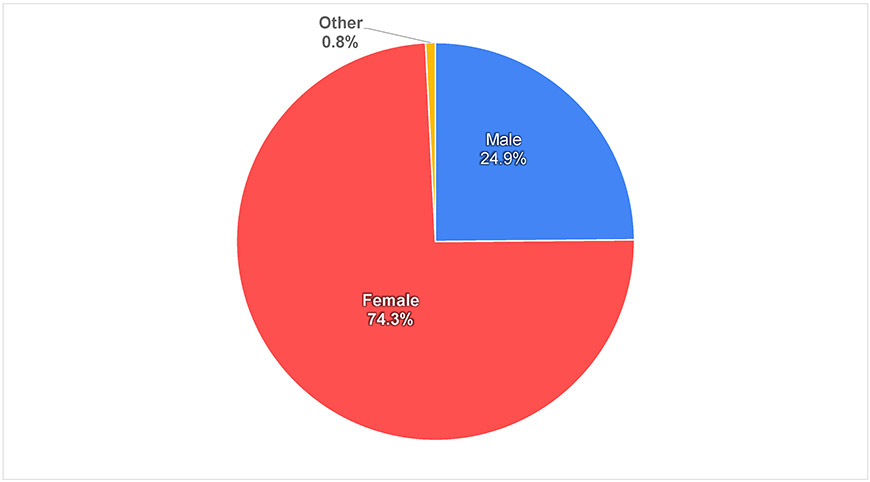
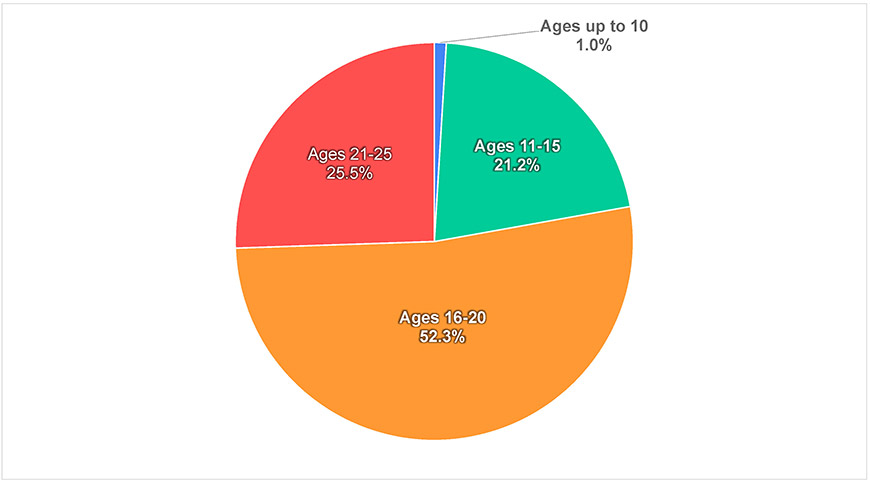
Survey Results and Analysis
In analyzing the results of each question, we looked at the data for all respondents around the world, for each region and for Japan, and we compared the similarities and differences to determine trends.
Q1) How many times have you participated in the Essay Contest including this year?
A number of the respondents, both within and outside Japan, have participated in the Essay Contest multiple times, indicating that they have a high level of interest in creating peace and a better future.
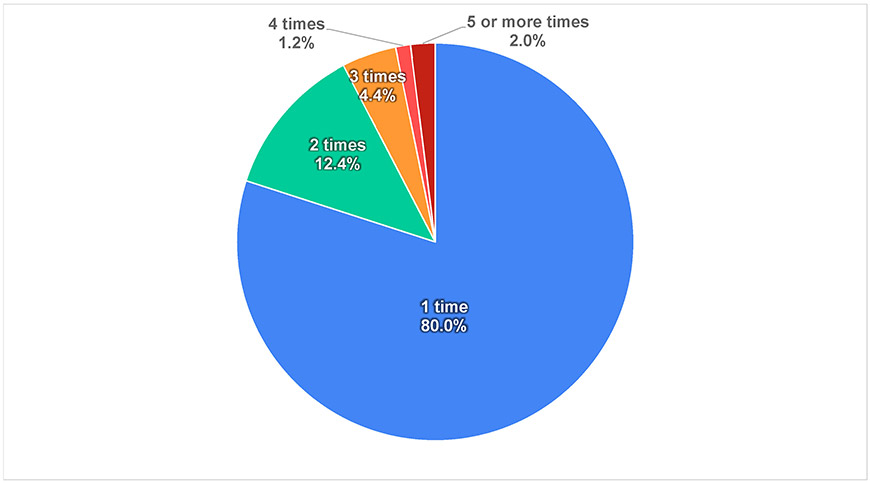
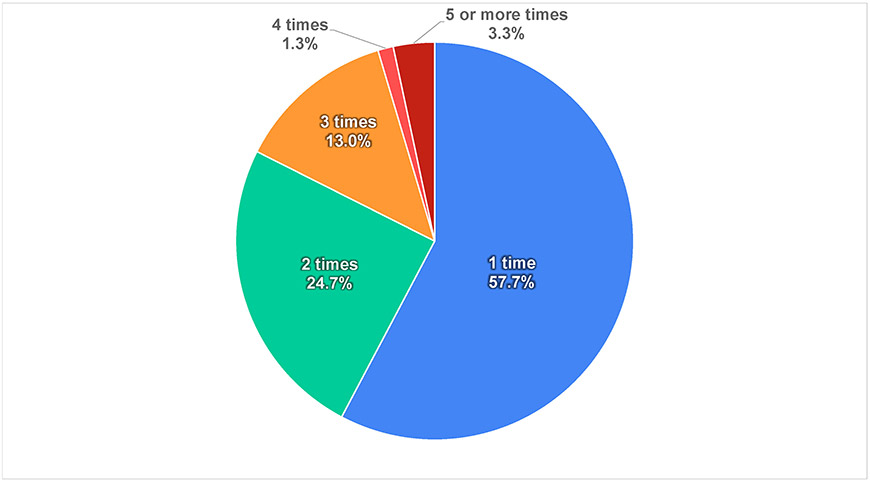
For young people, peace on earth and in nature is most important
Q2) What kind of peace is most important to you?
Comparison of children and youth
Among both children (up to 14 years old) and youth (15-25), the largest portion of respondents answered that “Peace on earth, including nature” was most important to them (47.8% for children and 40.3% for youth). The second most common answer for children was “Peace among humanity” (20.8%), while for youth it was “Peace of mind” (28.6%). From this, we can infer a tendency to place more emphasis on the inner world as children get older.
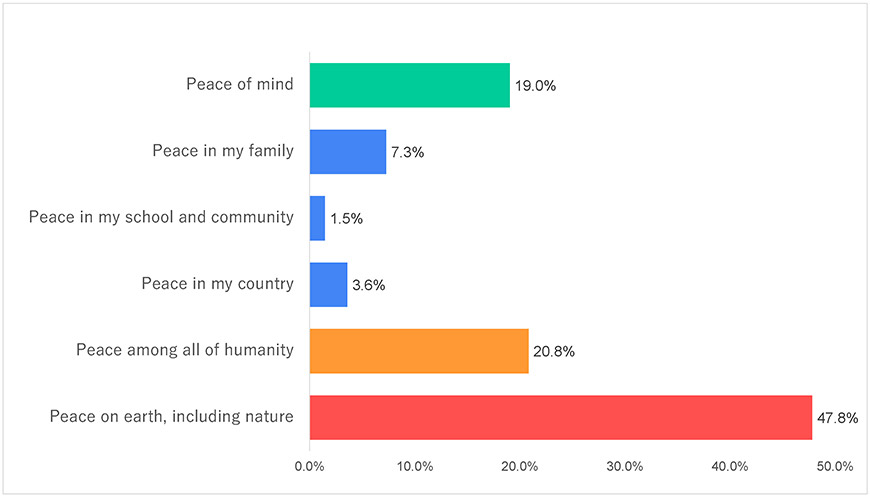
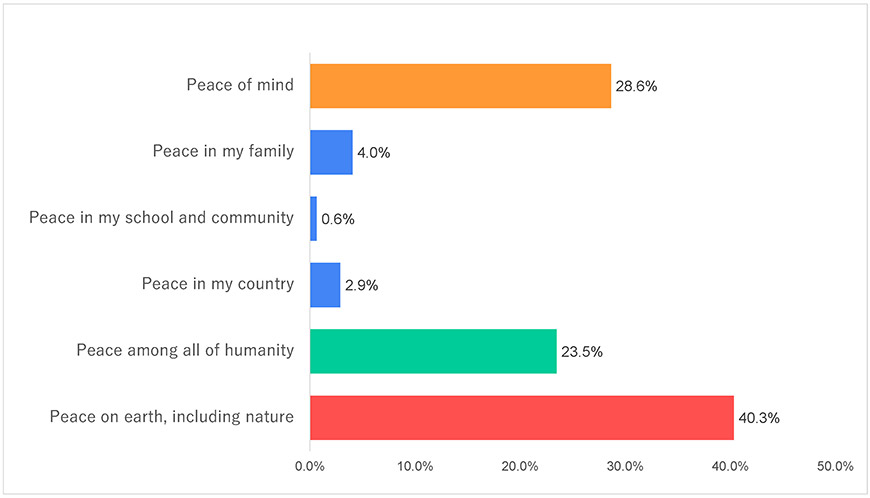
Responses from Japan
10.5% of respondents in Japan answered “Peace of mind”, which is significantly less than the total percentage of respondents who gave this answer (27.3%), and also less than the percentage of all Asia/Pacific respondents (28.0%). On the other hand, 24.2% of the respondents in Japan chose peace in their family, school/community, or country, while only 8.2% of the entire group of respondents chose these options.
See more survey results
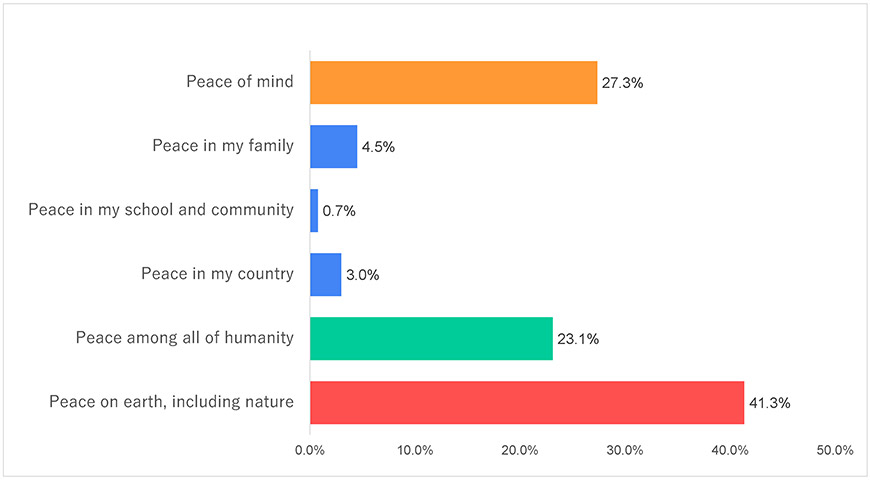
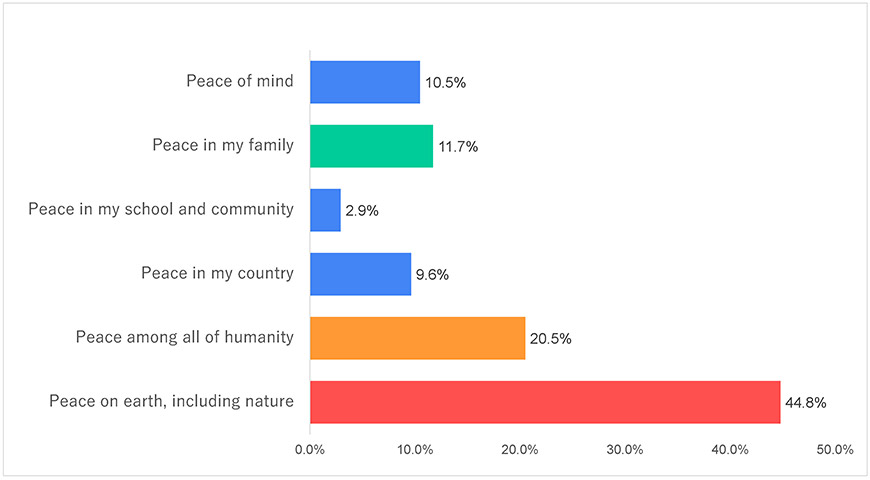
Has the world become more peaceful? Opinions differ by region.
Q3) Do you think the world is more peaceful now than in the past?
On the whole, respondents who answered optimistically that the world is more peaceful than in the past (44.3%) slightly outnumbered those who said the world is less peaceful than in the past (37.3%).
In Japan, the optimistic responses (59.4 %) greatly exceeded the pessimistic responses (13.8 %).
In the three regions of North America/Western Europe, Latin America, and Eastern Europe/Central Asia, more respondents answered that the world is more peaceful than in the past (ranging from 47.4% in North America/Western Europe to 59.8% in Eastern Europe/Central Asia). On the other hand, for the three regions of Asia/Pacific, the Middle East, and Africa, respondents were more pessimistic, saying that the world was more peaceful in the past (ranging from 41.1% in the Middle East to 48.8% in Africa).
See more survey results
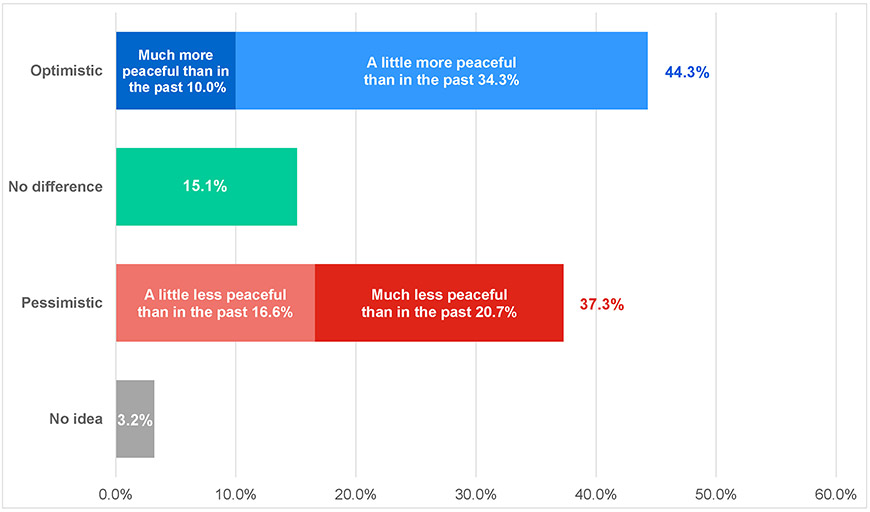
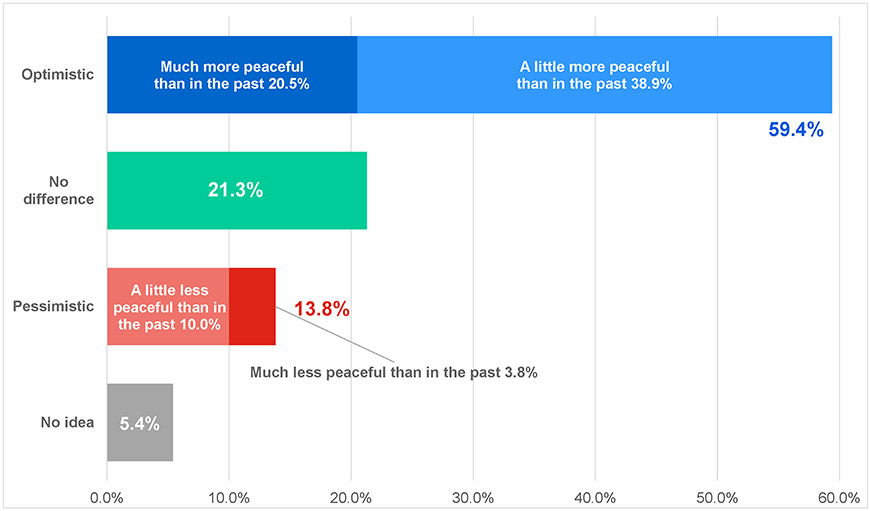
Level of peacefulness rated at 40-60%
Q4) Do you think the world is peaceful now? Rate the level of peacefulness with a percentage score.
The scores given by the respondents were grouped into ‘Low or pessimistic’ (0-30), ‘Average’ (40-60), and ‘High or optimistic’ (70-100). Regardless of their view on whether the world was more peaceful than in the past (Q3), respondents generally gave average scores (40-60) for the current level of peace. Among these, the scores given by respondents in Eastern Europe/Central Asia were relatively high (27.0% gave a score of 70 or higher).
See more survey results
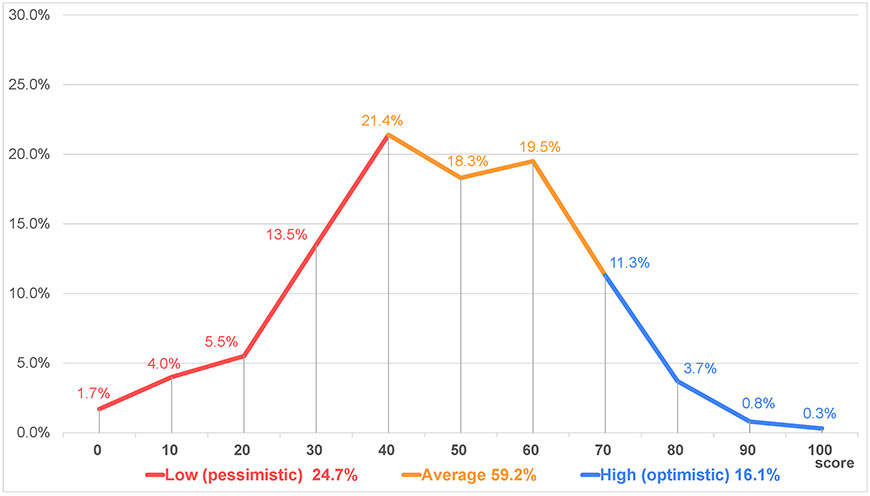
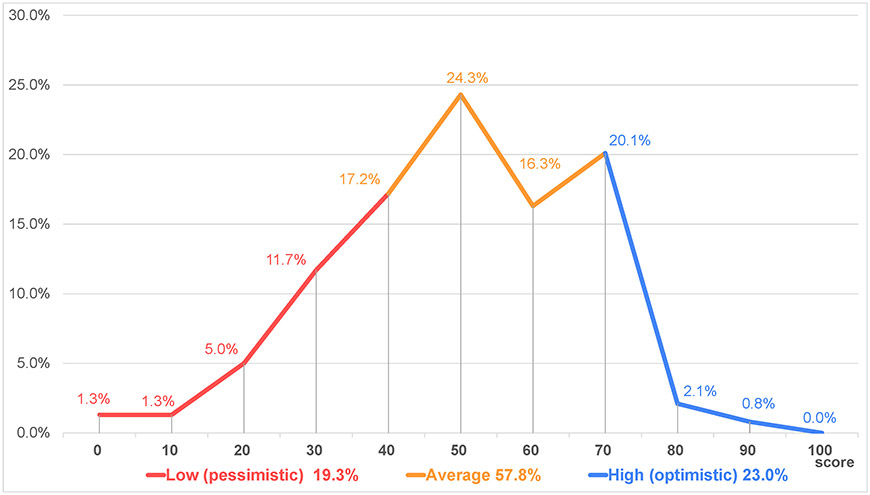
A quarter of youth think the world will become peaceful during their lifetime, while half do not
Q5) Do you think the world will become perfectly peaceful during your lifetime?
23.7% of all respondents said they think the world will become perfectly peaceful during their lifetime, while 52.1% said they don’t think so.
In Japan, only 9.6% answered “Yes”, while 72.8% responded negatively.
As for regional differences, the percentage who answered “Yes” was low in North America/Western Europe (8.7%) and in Latin America (12.2%). In the Middle East and Africa, where many respondents answered in Q4 that the world was more peaceful in the past, 36.7% and 38.7% respectively answered “Yes” to this question. It is worth noting that so many respondents in these regions are optimistic about the future, even though they expressed a pessimistic outlook on the current situation.
See more survey results
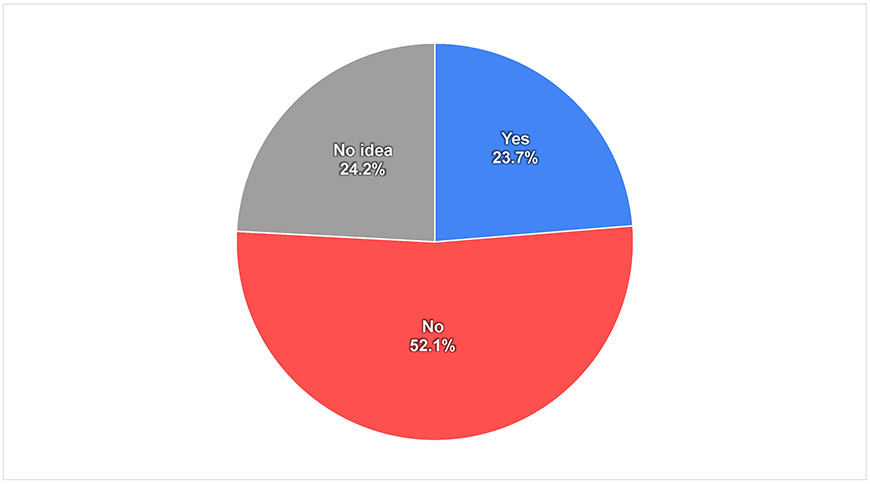
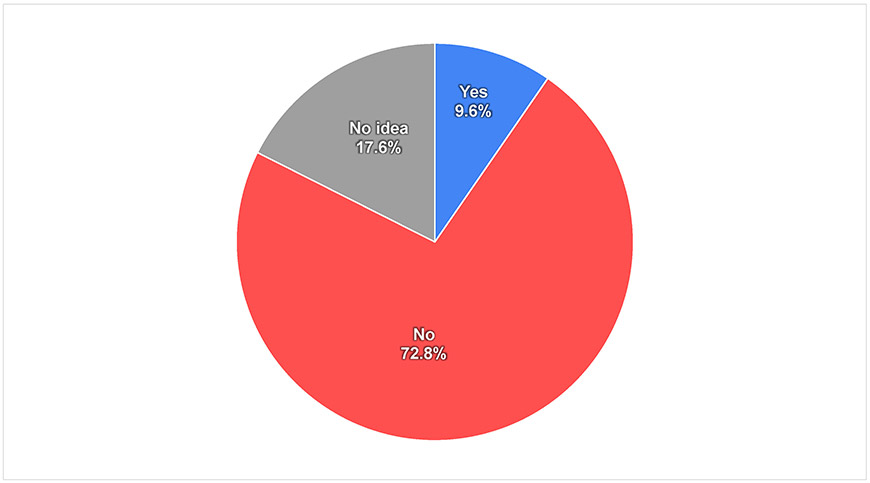
Youth see improvement through science and technology, education and access to medicine and social welfare
Q6) Which of the following situations do you think have improved in the world, compared with the past? (Choose up to 3)
The top three aspects of the world’s current situation that respondents said had improved were “Quality of life improved through the advancement of science and technology” (47.0%), followed by “Better access to education/Quality of education improved” (45.3%) and “Better access to medicine and social welfare” (39.0%).
The top answer by region was “Quality of life improved through the advancement of science and technology” for both Latin America and Africa, and “Better access to education/Quality of education improved” for all other regions.
Respondents in Japan had their own top answer, “Fewer wars and conflicts” (44.8%).
See more survey results
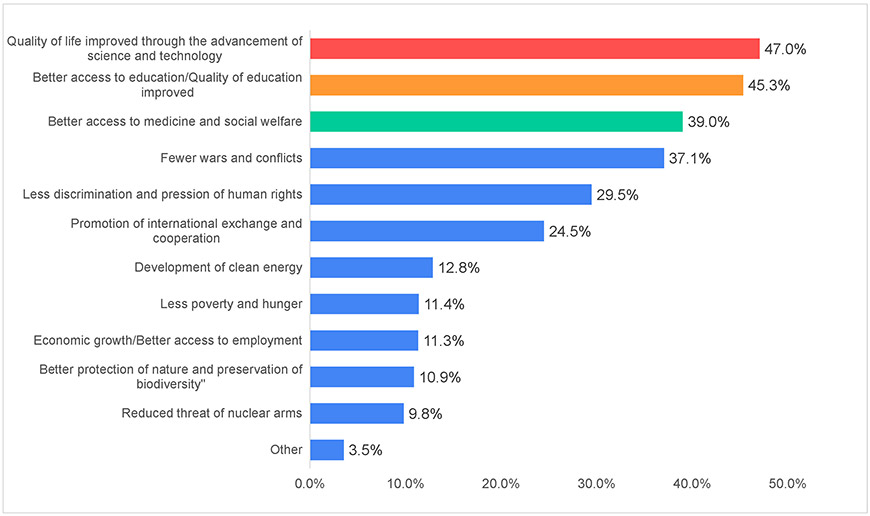
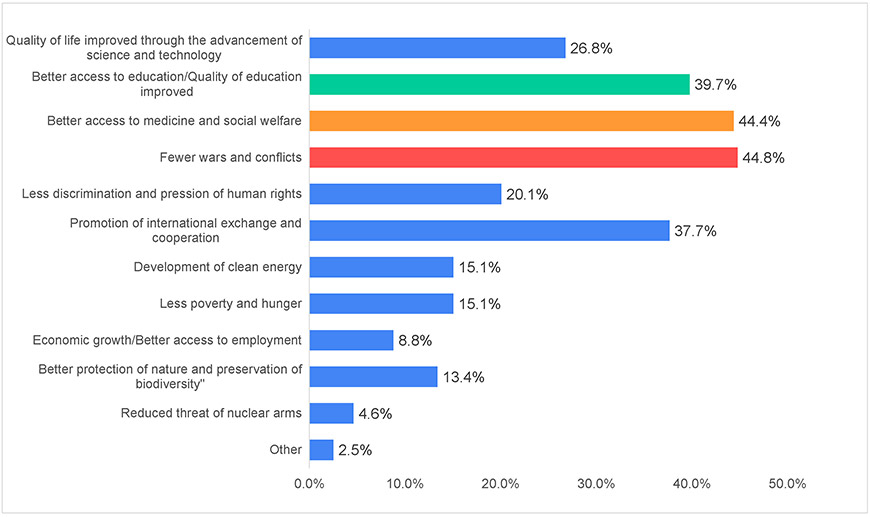
The top priority for world peace is ending discrimination and oppression. For Japanese youth, it is eliminating wars and conflicts.
Q7) What do you think are the most important agendas that need to be addressed in order to achieve world peace? (Choose up to 3)
According to respondents, the top three agendas that need to be addressed in order to achieve world peace are “No discrimination or oppression of human rights” (54.3%), followed by “No wars or conflicts” (41.9%) and “No poverty or hunger” (38.1%). Among the other responses, “Providing quality education for all” ranked second among respondents in Latin America, and “Political stabilization of each country, promotion of international cooperation” ranked second in Africa and third in Eastern Europe/Central Asia. These results can be regarded as reflecting the characteristics of those regions.
The fact that the top answers in both Q6 and Q7 were generally the same in all regions suggests that young people around the world share a common world view.
In Japan, the top answers for Q6 and Q7 were “Fewer wars and conflicts” and “No wars or conflicts”, suggesting that the idea of peace meaning ‘no wars and conflicts’ is deeply rooted in Japanese people as a result of the peace education they receive.
See more survey results
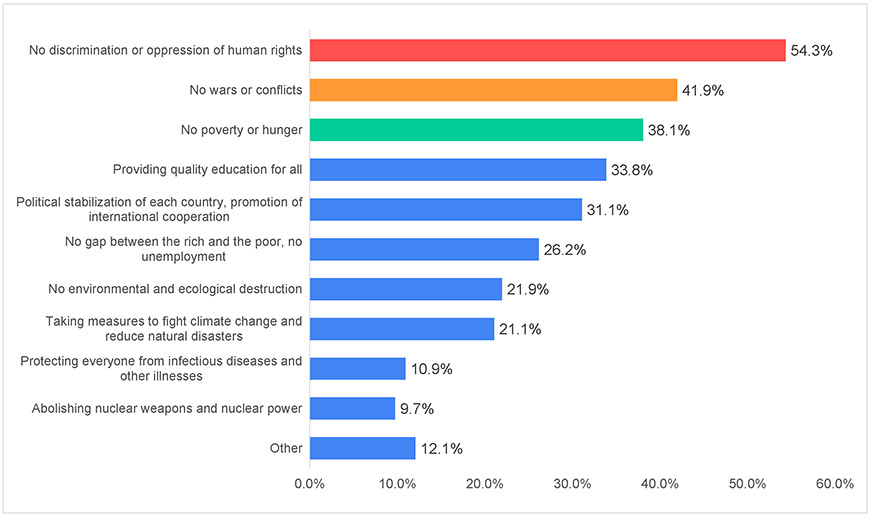
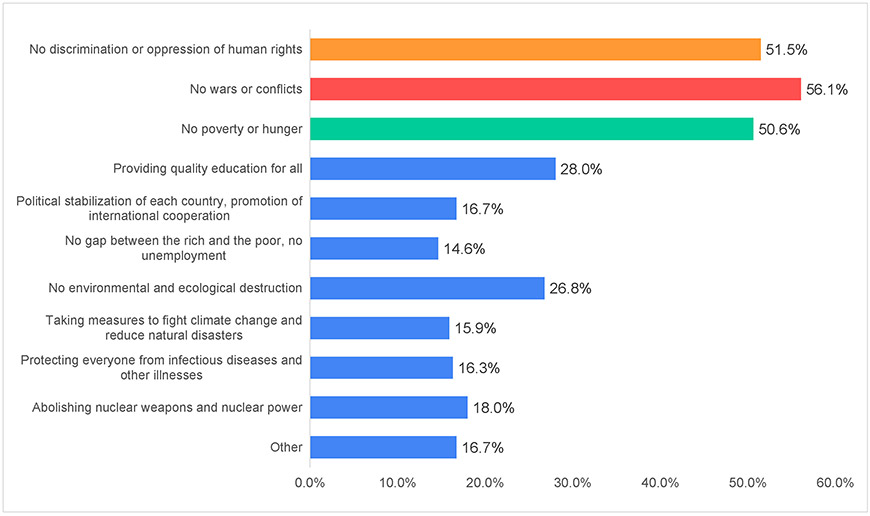
Is my country more peaceful compared to other countries? Bhutan ranks top in ‘Yes’ responses, Afghanistan in ‘No’. 90% of Japanese youth say ‘Yes’.
Q8) Do you think your country is more peaceful compared to other countries?
The percentages of “Yes” and “No” responses to the question “Do you think your country is more peaceful compared to other countries?” were roughly the same throughout the world, but the proportion of “Yes” responses was relatively higher in North America/Western Europe and in Eastern Europe/Central Asia, while the proportion of “No” responses was higher in the Middle East.
The 12 countries with the highest percentages of “Yes” responses and “No” responses are shown in Tables 8-1 and 8-2.
Japan was ranked 7th in “Yes” responses, with 88.7% of the total respondents answering that they think Japan is more peaceful compared to other countries.
See more survey results
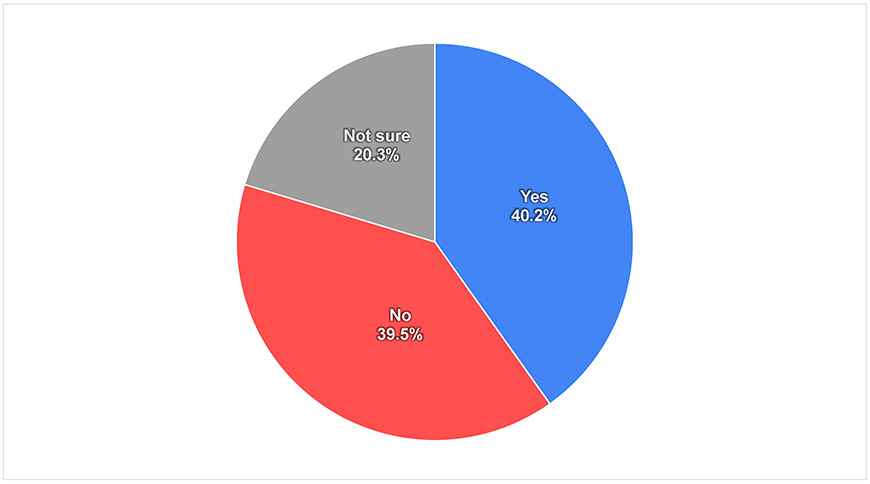
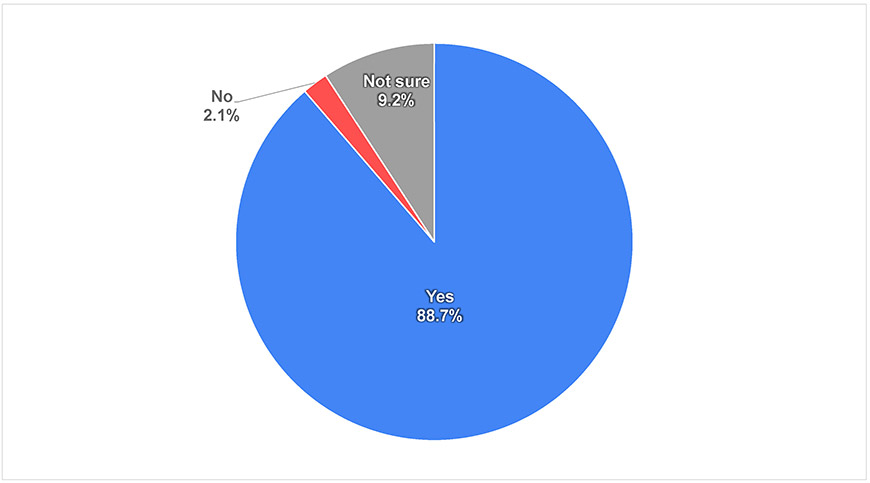
(Only countries with 10 or more responses are included)
| Rank | Country | Percentage of respondents who answered “Yes” |
|---|---|---|
| 1st | Bhutan | 100.0% |
| 2nd | Uzbekistan | 93.8% |
| 3rd | Turkmenistan | 93.8% |
| 4th | Ghana | 92.9% |
| 5th | Singapore | 90.2% |
| 6th | Zambia | 89.0% |
| 7th | Japan | 88.7% |
| 8th | Tanzania | 83.7% |
| 9th | Bulgaria | 80.0% |
| Sierra Leone | 80.0% | |
| Italy | 80.0% | |
| Costa Rica | 80.0% |
(Only countries with 10 or more responses are included)
| Rank | Country | Percentage of respondents who answered “No” |
|---|---|---|
| 1st | Afghanistan | 100.0% |
| 2nd | Myanmar | 94.7% |
| 3rd | Venezuela | 89.5% |
| 4th | Syria | 88.2% |
| 5th | Cameroon | 85.7% |
| 6th | Turkey | 85.0% |
| 7th | Iran | 84.6% |
| 8th | Lebanon | 81.8% |
| 9th | Thailand | 80.0% |
| 10th | Nigeria | 75.4% |
| 11th | Iraq | 74.2% |
| 12th | Jamaica | 72.7% |
In less peaceful countries, human rights, political stability, public safety and ending conflicts are seen as top priorities
Q9) What do you think is the most important issue that needs to be addressed in order for your country to be more peaceful?
Respondents named “Ending all discrimination or prejudice, including gender inequality” as the most important issue to be addressed in order for their country to be more peaceful. 15.1% of all respondents and 30.1% of respondents in Japan chose this answer. At the other end of the spectrum, 1.6% of respondents chose “Taking measures to fight climate change and reduce natural disasters”, and 2.2% chose “No environmental and ecological destruction”, indicating a lower level of concern about these issues. “Abolishing nuclear weapons and nuclear power” was chosen by 0.4% of all respondents (the least popular answer), and even in Japan, by only 3.3% of respondents.
In the twelve countries where respondents most frequently answered negatively about the level of peace in their country (Q8), the issues chosen as most important were “No wars or conflicts”, “Protecting human rights and freedom” and “Stabilizing the political situation and protecting public safety”.
As for regional differences, it is worth noting that the top priority among respondents in Latin America was “Providing quality education for all”.
See more survey results
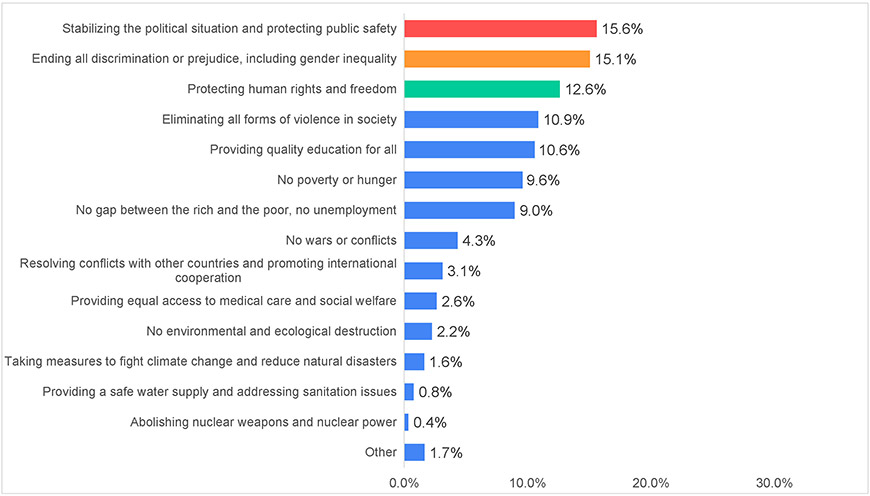
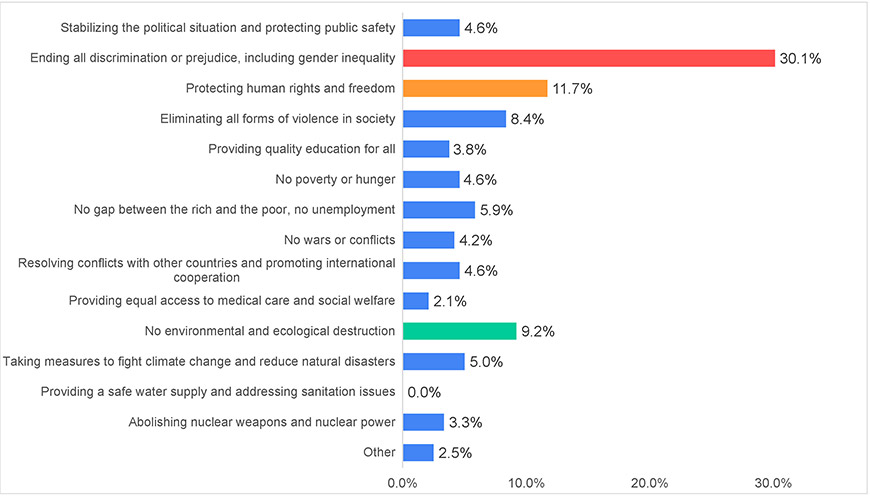
| Country | The Most important issue to be addresses | Percentage within country |
|---|---|---|
| Afghanistan | No wars or conflicts | 80.0% |
| Myanmar | Protecting human rights and freedom | 34.7% |
| Venezuela | Stabilizing the political situation and protecting public safety |
47.4% |
| Syria | No wars or conflicts | 64.7% |
| Cameroon | Stabilizing the political situation and protecting public safety |
28.6% |
| Turkey | Protecting human rights and freedom | 25.0% |
| Iran | Protecting human rights and freedom | 30.8% |
| Lebanon | Stabilizing the political situation and protecting public safety |
27.3% |
| Thailand | Protecting human rights and freedom | 36.7% |
| Nigeria | Stabilizing the political situation and protecting public safety |
26.0% |
| Iraq | Stabilizing the political situation and protecting public safety |
19.5% |
| Jamaica | Eliminating all forms of violence in society | 54.5% |
80% of youth engage in discussions of peace.
Q10) Do you discuss peace with people around you?
A total of 79.5% of the respondents answered that they “Very often” or “Sometimes” discuss peace with people around them. If we add in respondents who answered “Seldom/never, but would like to discuss”, the proportion rises to 90%, indicating a high level of interest in peace among Essay Contest participants. In particular, Africa had the highest percentage of respondents who answered “Very often” (50.9%) and “Sometimes” (39.4%). On the other hand, 10.0% of respondents in Japan answered “Very often”, and 50.2% answered “Sometimes”, suggesting that discussions about peace are about 20% less common in Japan when compared with the world as a whole.
If we compare the top 12 countries with “Yes” responses and the top 12 countries with “No” responses to the question “Do you think your country is more peaceful compared to other countries?” (Q8), the results show that the latter group tend to discuss peace more often.
See more survey results
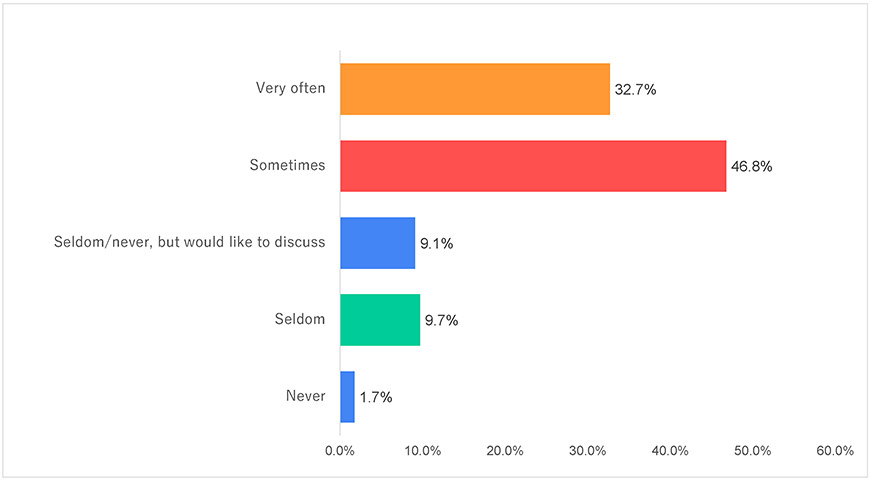
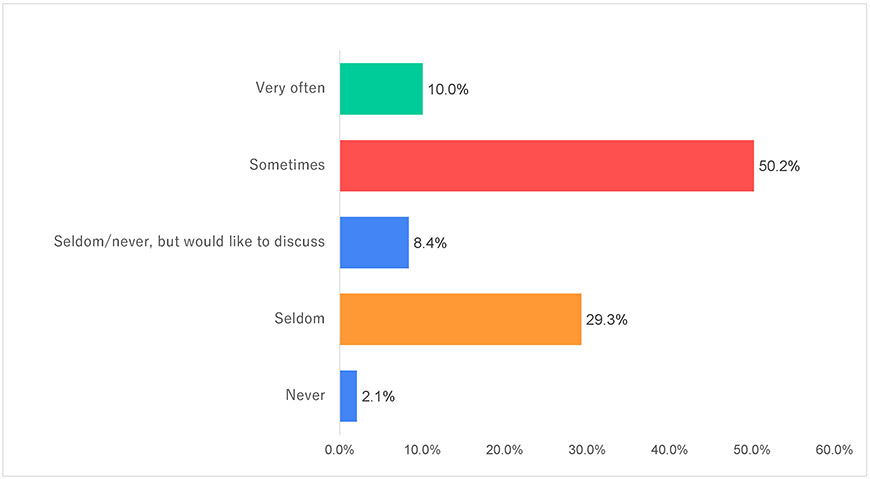
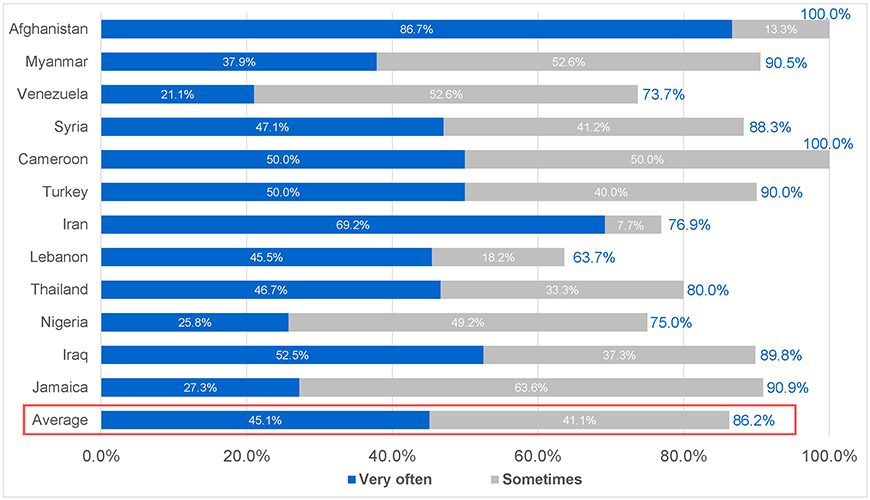
with the highest percentages of “No” responses in Question 8
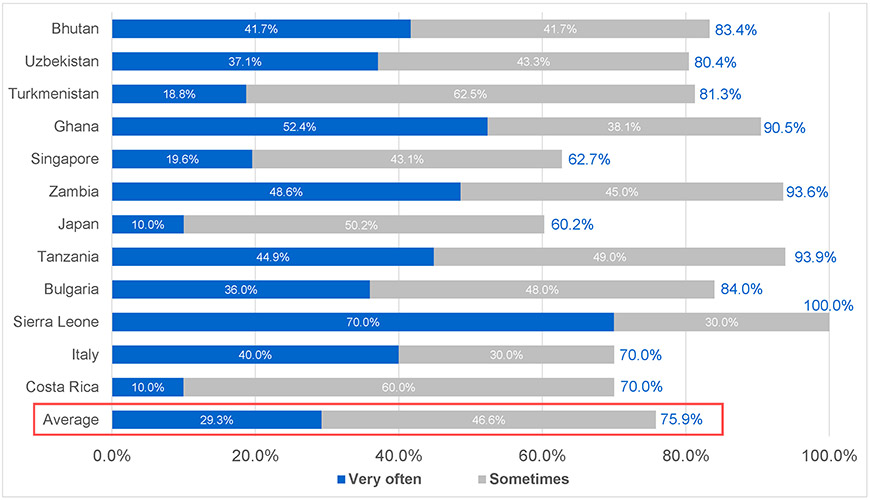
with the highest percentages of “Yes” responses in Question 8
Youth value kindness toward others and solving issues through discussion
Q11) What are you doing or willing to do for peace? (Choose all that apply)
Respondents were asked what they are doing or are willing to do for peace (choosing all answers that apply). “Be kind to others”, “Avoid conflicts with others, solve issues through discussion” and “Don’t cause trouble for others, be helpful to others” topped the list for the world as a whole, for each region, and for Japan, indicating that young people are placing importance on being mindful of their immediate relationships.
In North America/Western Europe in particular, more than 80% of respondents chose the top three actions mentioned above, while 72.3% chose “Daily practices like picking up trash and recycling” and “Protect the environment”, suggesting that people there are generally more action-oriented than in other regions.
It should also be noted that 61.5% of all respondents chose “Protect the environment”, while only 38.9% of respondents in Japan made this choice.
In Africa, where the highest percentage of respondents said they discuss peace with others (Q10), 50.9% of respondents chose “Join in peace movements”, the highest among all regions.
See more survey results
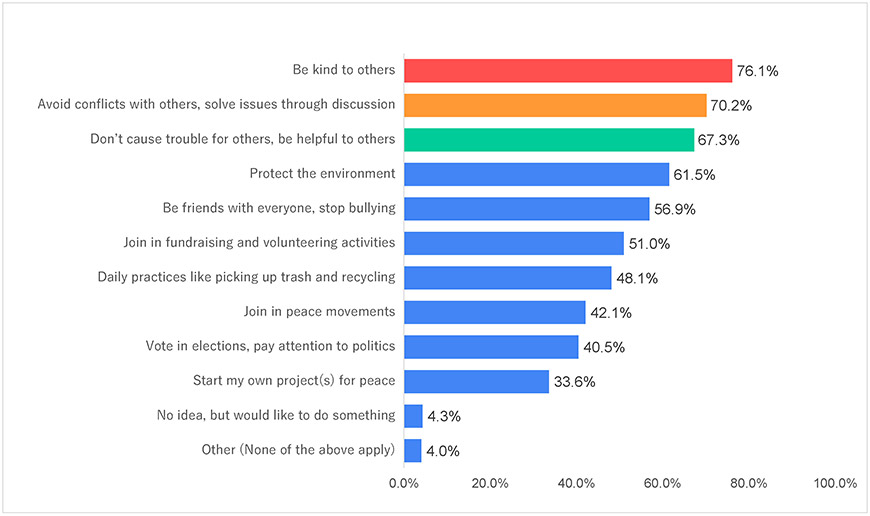
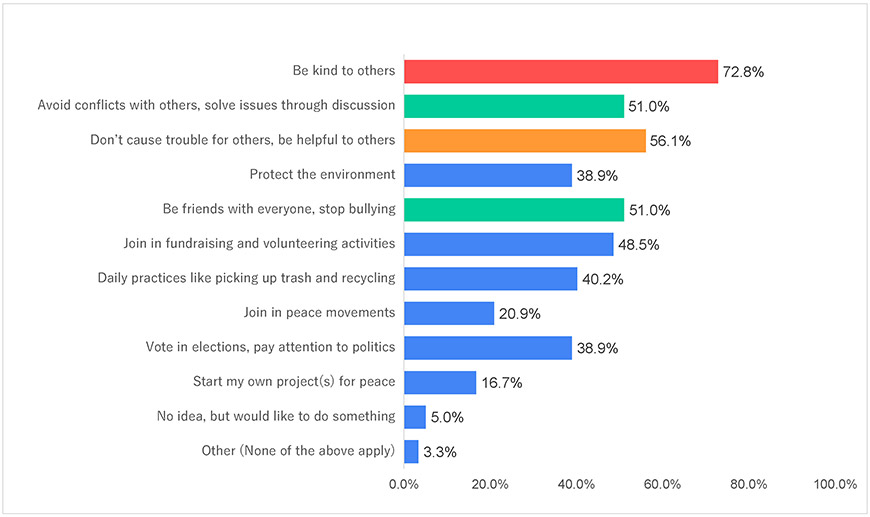
Learning, voicing opinions, and making connections top the list of requirements for contributing to peace
Q12) What do you need in your life in order to contribute to peace? (Choose all that apply)
When asked what they need in their life in order to contribute to peace, respondents’ top choice was “Education, space to learn” (76.5%), followed by “Chance to voice my opinions” (69.3%), “Connections with like-minded people of my generation” (68.5%), “Financial support” (51.3%) and “Connections with leaders” (45.2%).
In each region and within Japan, respondents made the same top three choices: “Education, space to learn”, “Chance to voice my opinions” and “Connections with like-minded people of my generation”. This suggests that young people around the world largely need the same things in their lives in order to contribute to peace.
See more survey results
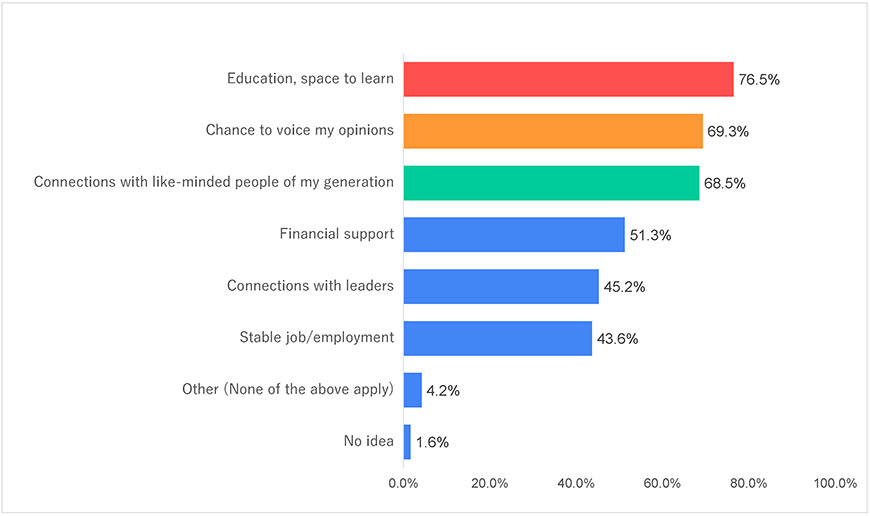
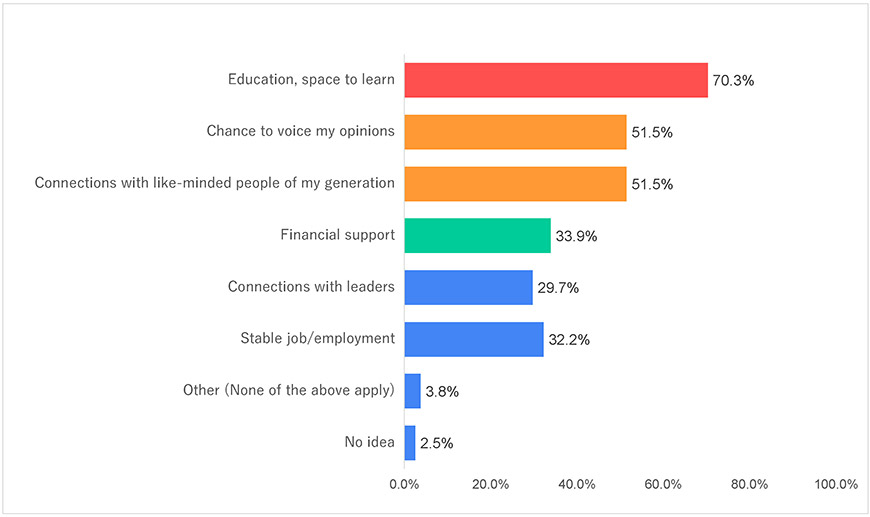
Conclusion
In order to get an overview of trends in the peace consciousness of young people around the world, this survey was designed with the following objectives:
Question 2 asked what young people think about when they think about peace: peace of mind, peace in their family, in their school and community, in their country, among all of humanity, or peace on earth (including nature).
In Question 3, we asked respondents to look back at the past. Question 4 focused on the present, and Question 5 looked ahead to the future, to see how young people perceive the trajectory toward world peace.
We then shifted to young people’s awareness of global issues. In Question 6, we asked what has improved in the world, and in Question 7, what still needs to be addressed.
In Questions 8 and 9, we asked about their perceptions of their own country, and what they feel are the greatest challenges, particularly in countries that are not perceived as peaceful.
Questions 10 and 11 explored how young people’s awareness of peace is manifested in their actions, and Question 12 asked what they need in order to contribute to peace.
The Goi Peace Foundation will continue to conduct the Survey on Peace Awareness in conjunction with the annual International Essay Contest for Young People, to collect the voices of children and youth around the world and to support them in creating their future as peacemakers.
Download
Youth Survey on Peace Awareness (Survey form)
Youth Survey on Peace Awareness c/o The Goi Peace Foundation
E-mail : info@goipeace.or.jp
